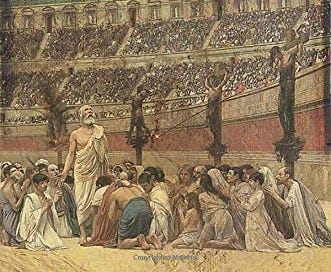If you are looking for the beginning of the study for Eusebius’ Church History then you can go HERE for a brief introduction. At the bottom of the introduction you will find the links to each section of the study guide as it becomes available. If you would like to see the growing list of book studies available for free on this site you can go HERE. Enjoy!
Virtues/Vices/Great Ideas: (Find them in the Text)
Despotism, Light vs. Darkness
Grammar Questions: (The Information of the Text)
According to Eusebius, why did Crescens instigate a plot against Justin Martyr?
What did the husband or the repentant woman do when she divorced him?
According to Justin Martyr, who wrote the book of Revelation?
What did Thebouthis do “because he had not been made bishop?”
What were the seven sects among the Jewish people (i.e. “the circumcision”) who rejected Jesus as Messiah?
According to Dionysius of Corinth, what should be done with “those who return after [a] moral or heretical lapse?”
What did Dionysius say that some “apostles of the Devil” had done?
According to Mileto of Sardis when did the Christian philosophy reach “full flower” among the Roman people?
What did Onesimus want which Melito supplied?
What did Eusebius say of Bardesanes’ attempt to reform his doctrine and teaching to be more orthodox?
Logic Questions: (Interpreting, Comparing/Contrasting, Reasoning)
What is meant by the statement, “before the Lord’s coming, Satan dared not blaspheme God, since he did not yet know his condemnation?”
Hegesippus says that within Christian churches “preaching corresponds with the Law, the Prophets, and the Lord.” What does this mean and why might it be important?
By what means is Mileto of Sardis arguing that the emperor should stop the persecution of Christians in Asia? What are his premises?
Which books in Melito’s compilation of the Old Testament appear to be missing? What might account for this?
Why might the Encratite heretics have rejected the apostle Paul’s writings in particular?
Rhetoric Questions: (The Analysis of Ideas in the Text)
Melito said in his letter to the emperor, “a just king would never have an unjust policy.” Is this true or false? Explain why you think as you do. Regardless of your first answer, why might this be a rhetorically powerful statement in Melito’s address?
How important is it to have orthodox beliefs? How does this relate to the salvation of an individual? To what extent can a person have wrong beliefs and still be genuinely a follower of Christ who is born again? Where should the lines be drawn? Explain your answer carefully.
Theological Analysis: (Sola Scriptura)
Read 1 Timothy 1:3-11. How does Paul’s warning to Timothy relate to what we have read in this lesson from Eusebius?
Read James 3:1. In light of what James says here, what should be the attitude of anyone who takes up a role as a teacher?



